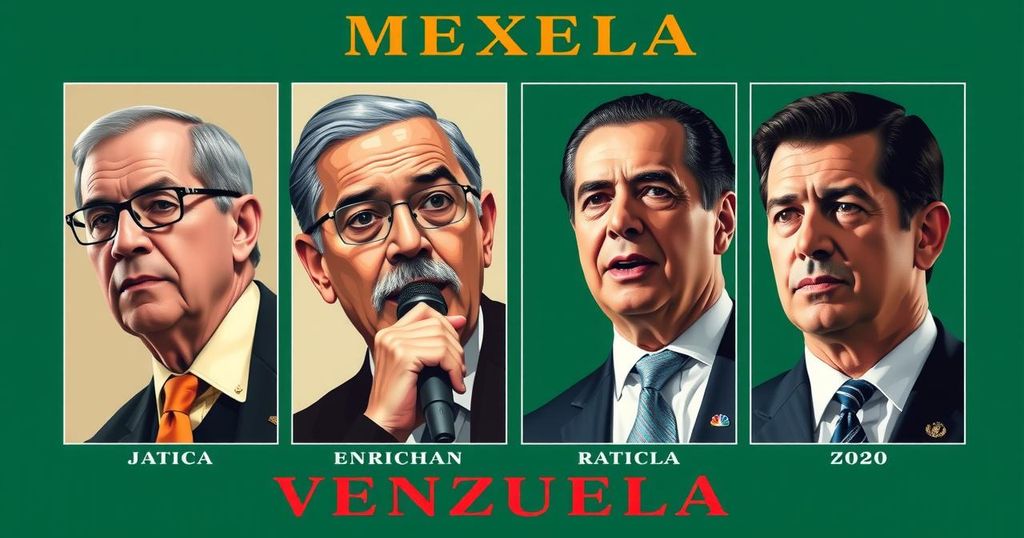Venezuela has declared former Mexican presidents Vicente Fox and Felipe Calderón persona non grata amid political turmoil. This measure coincides with the disputed election claims of opposition leader Edmundo González, who asserts a victorious claim against Nicolás Maduro. Venezuelan officials have gone further by issuing wanted posters for these leaders, complicating diplomatic relations.
Venezuela’s National Assembly has officially declared former Mexican presidents Vicente Fox and Felipe Calderón as personae non gratae, heightening tensions amid the ongoing political crisis in Venezuela. This action is part of a broader agenda by the ruling party, which also targets seven other former Latin American leaders who have expressed support for opposition leader Edmundo González Urrutia, who claims victory in the disputed 2024 elections. The government, however, has stated that incumbent Nicolás Maduro won the election, with Maduro recently sworn in for a third six-year term.
The pro-Maduro Assembly has branded Fox and Calderón as unwelcome, threatening to prosecute them as part of a so-called foreign force attempting to invade. Diosdado Cabello, Venezuela’s Minister of the Interior, further escalated the situation by unveiling wanted posters of the aforementioned leaders, accusing them of conspiring against Venezuela and endangering its peace. These posters have been distributed across the country, including major transportation hubs.
Both Fox and Calderón, members of Mexico’s National Action Party (PAN), have known reputations for their outspoken political views. Vicente Fox, who held office from 2000 to 2006, has gained notoriety for his satirical criticism of Donald Trump and his involvement in a chain of cannabis stores. Felipe Calderón, president from 2006 to 2012, faced controversies surrounding his former security minister, Genaro García Luna, who has recently received a lengthy prison sentence in the United States for colluding with drug traffickers. While neither Fox nor Calderón have made explicit comments regarding the recent election, both have shown their support for González through social media and public statements.
The list of targeted leaders also includes Mario Abdo (Paraguay 2018-2023), Mireya Moscoso (Panama 1999-2004), Ernesto Pérez Balladares (Panama 1994-1999), Jorge Quiroga (Bolivia 2001-2002), Jamil Mahuad (Ecuador 1998-2000), and Laura Chinchilla (Costa Rica 2010-2014). Following the Venezuelan Electoral Council’s announcement of Maduro’s victory, ex-President Andrés Manuel López Obrador declared that Mexico would respect the outcome, adhering to democratic principles, although he later stated that Mexico would abstain from participating in an international discussion about the elections.
Edmundo González’s claim to victory is supported by several countries, including the United States, Canada, and members of the European Union, while a faction led by Maduro enjoys backing from nations such as Russia and China. Amidst calls from government officials in Mexico, Brazil, and Colombia for an independent verification of election results, credible sources indicate that Gonzalez may have won decisively. Notably, the recent inauguration of Maduro was attended by several heads of state, although some allies, like Colombia’s Gustavo Petro, did not attend due to political reasons. The Mexican government was represented by its ambassador to Venezuela at the event, reinforcing the diplomatic stance of respect for Venezuela’s political sovereignty.
Ultimately, the situation encapsulates the deepening political division in Venezuela and highlights international responses to the ongoing crisis. As diplomatic relations become strained, the implications of these actions will reverberate through Latin America and the broader international community.
The political landscape in Venezuela has become increasingly contentious as conflicting claims over presidential authority erupt. The 2024 elections and the subsequent declaration of Nicolás Maduro’s victory amid allegations of voting irregularities have sparked international dissent and varying opinions among Latin American governments. Former leaders from several countries demonstrating support for Venezuelan opposition figures are facing backlash, as the Maduro-led government attempts to consolidate power. This polarization highlights the complex inter-nation dynamics and the influence of external support in regional politics.
Venezuela’s declaration of former Mexican presidents Vicente Fox and Felipe Calderón as unwelcome reflects the intensity of its current political crisis. As tensions escalate, the Venezuelan government accuses these leaders and others of conspiracy for supporting opposition claims against Maduro’s administration. With international backing shifting, the unfolding political drama sets critical precedents for Latin America and poses significant challenges to diplomatic relations and regional stability.
Original Source: mexiconewsdaily.com






